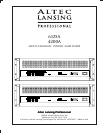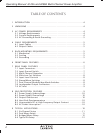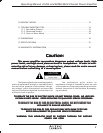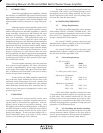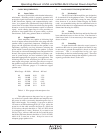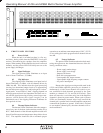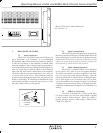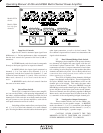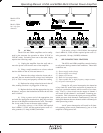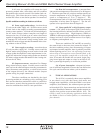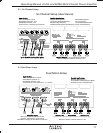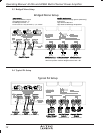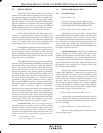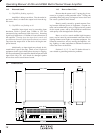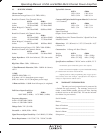
4
Operating Manual 6125A and 4200A Multi-Channel Power Amplifier
1. INTRODUCTION
The 6125A and 4200A power amplifiers combine
the efficiency of a MOSFET high-speed switching output
stage with the sophistication of modern microprocessor and
DSP technology to produce a multi-channel amplifier with
unprecedented versatility and power in a single 3RU pack-
age.
Although similar to other amplifiers with class D
output stages, the 6125A and 4200A amplifiers employ
internal microprocessor and DSP algorithms to optimize
output switching characteristics and eliminate the usual
harshness associated with high-frequency audio in stan-
dard class D amplifiers. This optimization results in a
spread-spectrum switched output that varies with input
amplitude and frequency, and minimizes radiated emissions
by eliminating the single-frequency high-energy radiated
interference normally associated with switching outputs.
The use of a simple linear power supply removes another
potential source of radio-frequency interference, an im-
portant consideration as racks become more and more
heavily populated with digital signal processing equipment.
A small switching supply using flyback topology provides
an efficient power source for logic, protection, pre-ampli-
fier and indicator circuits.
To assure reliable operation, the usual protection
from excessive high-frequency, DC offset, and thermal
overload is supplemented by power supply undervoltage,
power supply overvoltage, and output overcurrent detec-
tion, all monitored and controlled by the latest in minia-
turized microprocessor technology.
In sum, 6125A and 4200A amplifiers combine the
best of the new digital technologies with the best of the
traditional analog technologies to provide a product that
will supply clean sound at full output from every channel
while generating minimal heat, thus increasing the reli-
ability of every other piece of equipment in a rack as well
as preserving its own.
2. UNPACKING
As a part of our system of quality control, every
Altec Lansing product is carefully inspected before leav-
ing the factory to ensure flawless appearance. After un-
packing, please inspect for any physical damage. Save
the shipping carton and all packing materials, as they were
carefully designed to reduce to minimum the possibility
of transportation damage should the unit again require
packing and shipping. In the event that damage has oc-
curred, immediately notify your dealer so that a written
claim to cover the damages can be initiated.
The right to any claim against a public carrier can
be forfeited if the carrier is not notified promptly and if
the shipping carton and packing materials are not avail-
able for inspection by the carrier. Save all packing mate-
rials until the claim has been settled.
3. AC POWER REQUIREMENTS
3.1 Voltage Requirements
The 6125A and 4200A amplifiers can be operated
from nominal 120VAC or 240VAC, 50/60Hz mains. This
is user-configurable by changing the insert in the AC Inlet
(See section 7.9). The power connector on the amplifier
accepts a standard IEC-320 receptacle.
For nominal 120VAC operation, the power cord
should be three-conductor, rated for at least 13A (16AWG).
The line fuse should be type MDA, 12A.
For nominal 240VAC operation, the power cord
should be three-conductor, rated for at least 10A (18AWG).
The line fuse should be type MDA, 10A.
3.2 Current Requirements
1.) Idle (no audio):
6125A 4200A
120V: 0.81A 120V: 0.9A
240V: 0.42A 240V: 0.5A
2.) With typical audio inputs:
8Ω loads on all channels
120V: 4A 120V: 4.6A
240V: 2A 240V: 2.3A
4Ω loads on all channels
120V: 6.5A 120V: 7.0A
240V: 3.3A 240V: 3.5A
6125A and 4200A amplifiers consume less than
12 amps when all channels operate at 1/8 power into rated
(4 ohm) loads. This condition satisfies the UL, CSA and
building electrical code requirements for a piece of audio
equipment not to consume more than 80% of the current
available when plugged into a grounded 15 amp outlet and
operated at 1/8 of maximum power.
3.3 AC Grounding and Earth Grounding
To reduce the risk of ground loop hum, all system
ground references should originate at the same point in
your AC power distribution. Do not remove the amplifier’s
ground pin, as it creates a potential shock hazard.



